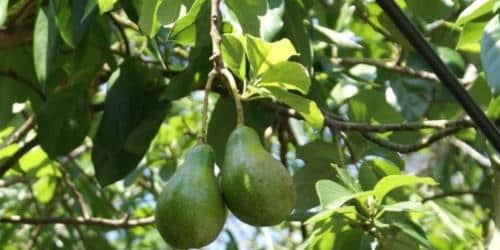Avocado farming is a rich and rapidly expanding enterprise. It is a healthy fruit that can be offered at a reasonable price in the market. Avocado trees produce their first crop of avocados after roughly 3-5 years. However, once they do, you should be able to reap the benefits for many years. This blog post will teach you everything you need to know about avocado farming. This will help you decide whether it is something you want to pursue as well. But, before we get started, let’s go over some fundamentals.
What Is Avocado?
Avocado, scientifically known as Persea americana, is a fruit that grows on the same tree. The fruit is oval in shape, with a tough outer covering, a fleshy edible core, and a huge seed in the center.
Avocado is high in nutrients and is utilized in a wide range of meals and culinary applications around the world.
What is Avocado Farming?
Avocado farming is a profitable economic venture that involves the cultivation and growth of Avocado fruit. Avocado, commonly known as Persea americana, is a nutritious tropical fruit that provides critical vitamins and minerals. This Avocado farming in Nigeria and Africa is a profitable business opportunity due to the huge demand for avocados in both domestic and international markets. Avocado plants flourish in warm, humid conditions, making Nigeria and other African countries great avocado farming areas.
Avocado farming can generate up to 40 tons per hectare and 40 to 120 fruits per tree each year with adequate care and management, depending on the variety, management tactics, and growth circumstances. Also, Avocado farming is becoming more profitable as worldwide demand for avocados grows, as it is highly sought after in industrialized countries for its health advantages and culinary purposes. Furthermore, the market for Avocado goods such as oil, butter, and paste is expanding.
Avocado trees may provide fruit for more than 30 years, making them an excellent long-term investment for growers. Great potential for profitability exists in avocado farming, according to research.
To achieve a successful Avocado farming business, sufficient knowledge and expertise in Avocado growing, pest and disease management, and marketing techniques are required.
The History of Avocado Farming
Avocados come originally from Central and South America. They have also been farmed for centuries in various tropical climates across the world. Avocado farming was a significant element of California’s agribusinesses throughout much of the twentieth century.
Avocado farming has had a long and rich history. What began as a small family business has grown into a multimillion-dollar avocado crop. Avocado farming can also be traced back to Mexico, Brazil, Israel, New Zealand, and other countries across numerous continents.
Common Types of Avocados Grown in the World (Avocado Varieties)
In Mexico alone, there are about 300 different avocado varieties. The Hass Avocado cultivar is the most common, accounting for more than half of global avocado production. There are, however, more common kinds, such as Fuertes and Bacon.
#1. Hass Avocado
Avocado Heights, La Habra Heights, and Fullerton were the first to discover Hass Avocado in the 1920s. The avocados were farmed by a family that began their avocado farming company with just 25 trees. It usually takes five to seven years for a Hass Avocado tree to be ready for harvest.
#2. Fuertes Avocado
After Hass, it is the second most popular avocado cultivar in Mexico and around the world. Fuertes Avocados have a pear shape and smooth medium-thin skin that looks like a hazelnut. Their fruits are usually larger than Hass’.
#3. Bacon Avocado
Bacon avocado, like Hass, originated in Avocado Heights, La Habra Heights, and Fullerton. It has a pear shape and bumpy skin that extends from the stem to the tip. The Bacon Avocado is a small, narrow fruit with smooth skin that grows between 25 and 30 feet tall and contains hard meat.
Benefits of The Avocado Farming Business In Nigeria
There are numerous advantages to investing in avocado farming, which include:
- Job creation: The avocado farming business employs farmers, laborers, and marketers, among others, and so contributes to the reduction of unemployment in Nigeria and Africa.
- Income generation: Because there is a huge demand for avocados in Nigeria and Africa, investing in avocado farming can be a rewarding investment for farmers.
- Foreign exchange earnings: Because avocados may be sold to other countries, the avocado farming sector can generate foreign exchange gains for Nigeria and Africa.
- revenue diversification: Farmers can diversify their revenue sources by investing in avocado farming, which can provide an extra income stream.
- Increase in GDP: Avocado farming can help the Nigerian and African economies flourish by raising the Gross Domestic Product (GDP).
- Increased government revenue: Taxes and tariffs paid by avocado producers and exporters might create revenue for the government.
- Opportunities for export: Nigeria and Africa may tap into the international avocado market, which is expected to expand in the future years.
- Infrastructure development: The avocado farming business can lead to the construction of infrastructure like roadways, storage facilities, and processing plants.
How To Start The Avocado Farming Business
Starting an avocado farm in Nigeria or Africa necessitates careful planning and execution. Here is a step-by-step guide to assist you:
#1. Land preparation
Remove grasses and trees from the area and loosen the soil to allow for aeration and water penetration. To boost soil fertility, apply manure during the second plowing. Avocado may grow in a range of soil types, but well-drained sandy loam soil rich in organic matter is recommended for optimum growth. The PH level should be neutral (5.5-7.0 alkaline).
#2. Avocado Cultivation Technique
Avocado may be propagated in the nursery through seed sowing and grafting. Mature fruit seeds are utilized for direct sowing in nursery beds or polyethylene bags. After 6 months of growing in the nursery, the seedlings should be moved to the main field. Dig a 90cm by 90cm pit and fill it with a 1:1 combination of dirt and manure. Plant from early February to April, when the rains are just beginning. Spacing might be 8m8m, 10m10m, or 12m12m. This will give you approximately 100 stands per hectare, but if you want to have up to 300 stands, use 8m4m, 10m5m, and 126m. However, the spacing depends on the type. It is suitable for growing in pots and containers.
#3. Irrigation In Avocado Farming
It necessitates humid circumstances throughout critical periods such as flowering and fruiting. Water them soon after transplantation to ensure rapid establishment. Avocado and pear trees require a lot of water to thrive. Irrigate them during the dry season or when there is a lack of rain. Drip irrigation is used in commercial avocado farming. Heat and dryness can cause leaves, flowers, fruit, and branches to fall.
#4. Manure
Apply urea every 3-4 months at a rate of 15-20 tonnes per hectare. Avocado plants require a lot of nitrogen to thrive well because they are heavy eaters. The plant can only grow with organic stuff. However, you can use both organic and non-organic in avocado farms.
#5. Weeding
Weeding should be done as soon as possible, either mechanically or manually. At this stage, you can use pesticides judiciously or hire employees to clear the weeds for you.
#6. Intercropping in Pear Farming
Because nitrogen is essential for avocado trees, intercrop them with legumes such as beans, soya beans, groundnuts, and so on. They will repair the soil while also adding nutrients to it. Money earned from crop proceeds will be added to your income.
#7. Pruning
Avocado trees have straight and well-arranged branches and may not require pruning, but any tree with clustered branches should be lightly clipped.
#8. Disease/Pests
Mealybugs, mites, scales, and other pests are common. While typical illnesses include fruit spots, root rot, leaf rot, and so on. To combat them, use insecticides and pesticides. Plant a resistant variety.
#9. Harvesting/Yield
Harvesting can begin as early as 5-6 years depending on the type and technique of propagation. If you employ the grafted approach, you can begin harvesting in three years, much like a hybrid variety. When the green matures, it turns yellow, while the purple turns brown. It takes around 5-10 days for them to soften. You can cut the fruit with a sharp tool or pick it with your hand. Allowing them to fall on their own will cause them to be damaged (broken).
The yield is determined by the cultivar, management tactics, and age of the tree. One tree can produce 200-500 fruits, although productivity declines after 10-12 years.
#10. Marketing
Avocado farming enthusiasts consistently make money. Sell to market traders, and fruit vendors, or export to other countries. Avocado and pear are rarely enough to feed the world’s rising population, and before you blink, they’re out of stock.
Health Benefits Of Avocado
Avacado also has certain health benefits, some of which are as follows:
#1. It Reduces Cholesterol
Avocado is heavy in fat and extremely beneficial to the body; one cup of sliced avocado contains 32% of the daily fat intake. It is a monounsaturated fat that aids in the prevention of stroke and heart disease.
#2. It Helps To Absorb Other Nutrients
Many essential vitamins are fat soluble and must be absorbed through the skin. These vitamins include vitamins A, K, D, and E; adding avocado to heavy meals like bread will benefit the body greatly.
#3. It Can Relieve Arthritis symptoms
Avocados include Polyhydroxylated Fatty Alcohols (PFAs), an anti-inflammatory substance that aids the body in inflammation reduction. It also contains antioxidants such as vitamin C and vitamin E, which aid in the battle against inflammation and may aid in the relief of Arthritis symptoms.
#4. It Helps Look After The Eyes
Avocado includes lutein and zeaxanthin, which are carotenoids that are important for eye health. They protect the eyes from harmful light waves while also lowering the risk of eye disease.
#5. It Contains More Potassium Than A Banana
Avocado fruit contains 14% of the needed daily intake of potassium, which is higher than the 10% contained in a banana.
#6. It Is Filled With Nutrients
Avocado includes 20 vitamins and minerals, including a fourth of the daily requirement for vitamin C, which is essential for tissue growth and repair. It also contains B-6, which helps the body fight infection.
How Long Does it Take to Grow an Avocado?
Patience is crucial for success whether you start with a seed or a nursery-grown tree. Plant a tree, and you’ll have to wait three or four years for it to bear fruit. Begin with a seed and wait 13 years or more. Nonetheless, there’s something special about cultivated avocados that makes the wait worthwhile.
What is the Downside of Avocado Farming?
Farmers cut down older trees and replace them with young avocado trees, draining local water supplies and contributing to deforestation. Farmers in Michoacán, one of Mexico’s most important ecosystems, have been cutting oak and pine trees at an alarming rate for avocado orchards.
How Profitable is Avocado Farming in Nigeria?
Avocado farming is extremely profitable, with yields of up to 25 tons per hectare and a quick return on investment. Avocado is a popular fruit in both domestic and international markets due to its high nutritional value and numerous health advantages.
Can Avocado Grow in Nigeria?
Avocado can be found in Nigeria’s forests, farmlands, and homesteads. Aside from these, avocado is grown to some extent in the country’s central region. Avocado is primarily available in Nigeria’s southern and central regions.
How Long Do Avocados Take to Ripen?
Unripe, hard, or green fruit might take four to five days to ripen at room temperature, making it ideal for upcoming celebrations. Just keep an eye on the fruit to ensure that the warmth in your kitchen does not cause it to ripen too soon.
Conclusion
To summarize, the avocado farming business in Nigeria and Africa offers considerable economic and health benefits. Avocado farming can be a profitable endeavor due to its expanding global demand and high-value market. Avocado consumption has expanded in both local and international markets due to the multiple health advantages linked with the fruit. Furthermore, avocado farming requires little cash, making it an attractive prospect for small-scale growers.
Related Articles
- DOLLAR TREE LOGO: The Inspiring Story Behind the Brand
- Dates Farming: Best Beginners Guide 2023
- BACON BRANDS: The World’s Top 13+ Turkey & Veggie Bacon Brands
- Best Online Business Ideas to Try Out in Nigeria 2023
- HOW TO MAKE A DECISION: Effective Guidance to Avoid Mistakes & Disappointment






